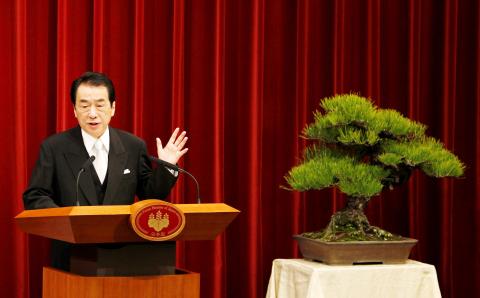Japanese Prime Minister Naoto Kan wants this year to be the year Japan opens up to rest of the world and yesterday called for debate on raising the sales tax to prop up ailing finances as the country’s population shrinks and ages.
To revive its struggling economy, Japan needs to embrace free trade and reform its protected farming sector, Kan said in a nationally televised press conference to set his agenda for the new year.
“I want this to be Year One of opening up the country” in the modern era, Kan said.

PHOTO: REUTERS
Japan is facing increasing competition from regional rivals like China, which overtook it to become the world’s No. 2 economy, and South Korea, which is ahead of Japan in terms of free-trade deals.
Tokyo is considering whether to join a US-backed free-trade zone called the Trans-Pacific Partnership that nine countries are negotiating. Business leaders say Japan must join the partnership or suffer a competitive disadvantage, but farmers are opposed amid worries that cheaper imports would ruin them.
In office since June last year, Kan also raised the possibility of increasing the 5 percent sales tax to shore up the country’s finances given its massive national debt, nearly double the country’s GDP, and spending on social programs.
Still, the move is a political risk. Kan disastrously suggested raising Japan’s sales tax to as high as 10 percent just before the parliamentary elections in July last year, contributing to the governing Democratic Party losing control of the upper house, a recipe for political gridlock.
“The need for a discussion about social welfare and the -resources required, including tax reform and raising the consumption tax, is clear to everyone,” he said.
Kan said he hoped to draw up a general financial plan by June. He has already announced plans to cut the country’s corporate tax rate by 5 percentage points to 35 percent in a bid to help businesses stay competitive and lure investment.
Japan’s economy is entering its third decade of stagnation. Last month, the Cabinet approved a record ¥92.4 trillion (US$1.11 trillion) draft budget aimed at creating jobs and reviving growth.

IN THE AIR: While most companies said they were committed to North American operations, some added that production and costs would depend on the outcome of a US trade probe Leading local contract electronics makers Wistron Corp (緯創), Quanta Computer Inc (廣達), Inventec Corp (英業達) and Compal Electronics Inc (仁寶) are to maintain their North American expansion plans, despite Washington’s 20 percent tariff on Taiwanese goods. Wistron said it has long maintained a presence in the US, while distributing production across Taiwan, North America, Southeast Asia and Europe. The company is in talks with customers to align capacity with their site preferences, a company official told the Taipei Times by telephone on Friday. The company is still in talks with clients over who would bear the tariff costs, with the outcome pending further

A proposed 100 percent tariff on chip imports announced by US President Donald Trump could shift more of Taiwan’s semiconductor production overseas, a Taiwan Institute of Economic Research (TIER) researcher said yesterday. Trump’s tariff policy will accelerate the global semiconductor industry’s pace to establish roots in the US, leading to higher supply chain costs and ultimately raising prices of consumer electronics and creating uncertainty for future market demand, Arisa Liu (劉佩真) at the institute’s Taiwan Industry Economics Database said in a telephone interview. Trump’s move signals his intention to "restore the glory of the US semiconductor industry," Liu noted, saying that

NEGOTIATIONS: Semiconductors play an outsized role in Taiwan’s industrial and economic development and are a major driver of the Taiwan-US trade imbalance With US President Donald Trump threatening to impose tariffs on semiconductors, Taiwan is expected to face a significant challenge, as information and communications technology (ICT) products account for more than 70 percent of its exports to the US, Chung-Hua Institution for Economic Research (CIER, 中華經濟研究院) president Lien Hsien-ming (連賢明) said on Friday. Compared with other countries, semiconductors play a disproportionately large role in Taiwan’s industrial and economic development, Lien said. As the sixth-largest contributor to the US trade deficit, Taiwan recorded a US$73.9 billion trade surplus with the US last year — up from US$47.8 billion in 2023 — driven by strong

STILL UNCLEAR: Several aspects of the policy still need to be clarified, such as whether the exemptions would expand to related products, PwC Taiwan warned The TAIEX surged yesterday, led by gains in Taiwan Semiconductor Manufacturing Co (TSMC, 台積電), after US President Donald Trump announced a sweeping 100 percent tariff on imported semiconductors — while exempting companies operating or building plants in the US, which includes TSMC. The benchmark index jumped 556.41 points, or 2.37 percent, to close at 24,003.77, breaching the 24,000-point level and hitting its highest close this year, Taiwan Stock Exchange (TWSE) data showed. TSMC rose NT$55, or 4.89 percent, to close at a record NT$1,180, as the company is already investing heavily in a multibillion-dollar plant in Arizona that led investors to assume